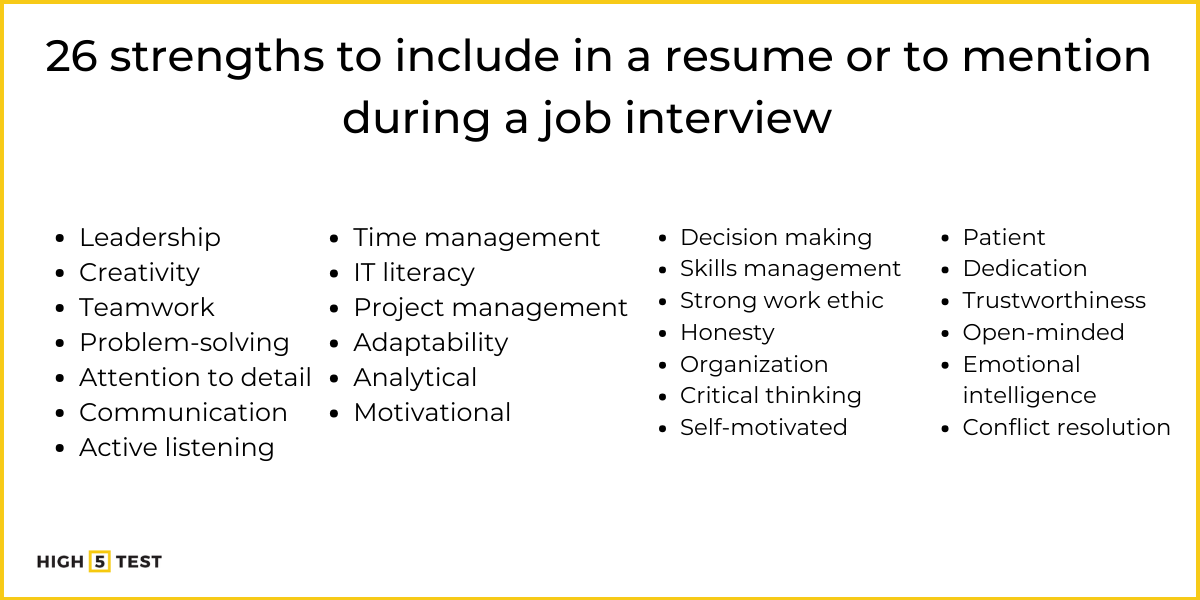Choosing the right strengths for your resume, cover letter, and interviews can be the difference between a job offer and rejection. However, many people are unsure how to write and format these documents in a way that will get them noticed. This article is a fantastic starting point with a list of strengths you can use when applying for jobs. Luckily, if you want expert advice on moving past the interview and landing the offer, you’re in the right place.
You’ll learn how to stand out from other applicants if you include some of these strengths in your resume. A standout resume or cover letter needs a deep understanding of your unique strengths and skills, and how they align with the role you’re pursuing. The HIGH5 strengths assessment provides a comprehensive, scientifically-backed approach to identifying your top five professional strengths and talents. Look into your natural abilities with confidence and discover how they lead to your dream career. The HIGH5 test equips you with all the insights needed to create a compelling narrative that sets you apart to hiring managers.
How can I add professional strengths to my resume?
Your resume should showcase your strengths to convince the hiring manager that you can excel in your profession, even if there’s still more to learn. For example, if you’re applying for an office job, emphasize your organizational skills on a resume like this:
- “Organized and managed all incoming receipts” or
- “Strong attention to detail”
On the other hand, if you’re applying for a manual job, you might highlight physical strength: (e.g., “Able to lift to 50 lbs” or “familiar with using power tools”).
Leveraging a strengths-based assessment like the HIGH5 test can be an invaluable tool in this process.
By understanding your top five strengths, the HIGH5 test provides a comprehensive understanding of your unique talents and abilities, so you can showcase them in your resume. What’s better: our detailed report offers guidance on how to articulate these strengths in a way that aligns with job requirements, which enhances your chances of standing out as a candidate.
Resist the urge to include every strength you have ever used (even if they’re awesome). Some of them may not be relevant to the role you’re applying to. For example, for a research assistant role, listing creativity may actually hurt your chances of landing the job. Aim for 5-7 well-chosen strengths. Think of each experience as a different way in which you showed various soft skills, such as:
- Leadership
- Creativity
- Responsibility
- Courage
- Integrity
- Determination
- Discipline
- Empathy
When you write a resume or cover letter, showcase a versatile skill set that can be used effectively in the job you’re applying for. So, what’s the key to crafting a resume or cover letter? Demonstrate a diverse skill set that aligns with the job requirements. Think about your transferable skills, as well. The HIGH5 test identifies strengths in actionable categories like strategic thinking and relationship building, providing precise guidance on which strengths to emphasize in your resume.
Pro Tip From HIGH5
When listing your strengths in your resume, consider utilizing the language and insights from your HIGH5 strengths report. This will not only ensure you accurately represent your true abilities but also demonstrate your self-awareness and dedication to personal and professional growth.
Why is it important to showcase strengths in a resume?
Did you know that only about 20% of people who apply for a job get called for an interview [1]? Even if their resume is good, that means 80% of applicants are getting rejected. This is why your resume is so important. You need to persuade the hiring manager that you’re an excellent fit for the job by highlighting your strengths. And newsflash: you’ve got an average of seven seconds to make a great first impression. It’s much more than just about showing what you can do; it’s also about suggesting what you can become, and how you would grow into that role if given the chance. Showcase (and quantify) your achievements, if possible. Recruiters love to see numbers and statistics.
Using a free strengths test (like HIGH5) to identify your strengths can be a game-changer for your resume. Not only will it help you accurately showcase your skills and abilities, but it will also give you the language to articulate them effectively. Insights from the HIGH5 test can highlight your strengths and can be a game-changer for your resume. Not only will it help you accurately showcase your skills and abilities, but it will also give you the language to articulate them effectively. Include a few bullet points under each strength demonstrating your desire to develop yourself further within the position. This will show the hiring manager that you’d be a great addition to the company.
Pro Tip From HIGH5
When preparing for interviews, review your HIGH5 strengths report and identify specific examples or accomplishments that demonstrate how you’ve leveraged these strengths in past roles or experiences. This will help you provide concrete, tailored responses that resonate with potential employers.
26 examples of strengths to list on a resume/CV
26 examples of strengths that you can include in your resume or CV to increase your odds of being called in for an interview:
- Leadership
- Creativity
- Teamwork
- Problem-solving
- Attention to detail
- Communication
- Active listening
- Time management
- IT literacy
- Project management
- Adaptability
- Critical analysis
- Motivation
- Decision making
- Skills management
- Strong work ethic
- Honesty
- Organization
- Critical thinking
- Self-motivation
- Patience
- Dedication
- Trustworthiness
- Open-mindedness
- Emotional intelligence
- Conflict resolution

Pro Tip From HIGH5
Identify which of these strengths resonate with your HIGH5 results to tailor your resume more effectively. Employers seek individuals who not only have the skills but also the intrinsic motivations that align with their organizational culture. Highlighting your HIGH5 strengths ensures you present yourself as a candidate who is not only capable but also deeply engaged with your work.
It’s a scientifically validated approach that’s continually refined thanks to our rapidly growing community who participate in our free strengths test! By making this program accessible to everyone, HIGH5 is helping to promote positive collaboration and understanding in all areas of life.
Leadership
Inspires and guides teams towards achieving goals, demonstrating vision and accountability.
Creativity
Generates innovative ideas and solutions, adept at thinking outside conventional frameworks.
Teamwork
Collaborates effectively with others, contributing to group goals and supporting team members.
Problem-solving
Identifies issues quickly and uses logical reasoning to analyze solutions and resolve problems.
Attention to detail
Ensures task precision and accuracy, catching errors before they can become larger issues.
Communication
Articulates ideas clearly and effectively, excelling in both written and verbal interactions.
Active listening
Pays close attention to the communication of others, ensuring understanding and responsiveness.
Time management
Manages time efficiently, prioritizing tasks and meeting deadlines consistently.
IT literacy
Proficient in various computer applications and systems, adapting to new technology swiftly.
Project management
Oversees projects from conception to completion, ensuring efficiency and goal fulfillment.
Adaptability
Adjusts quickly to new conditions and challenges, maintaining effectiveness across various scenarios.
Critical analysis
Possesses strong analytical abilities, interpreting and synthesizing information to make informed decisions.
Motivation
Encourages and inspires individuals to achieve their best through positive reinforcement and leadership.
Decision making
Makes informed decisions efficiently, considering both the short-term and long-term impacts.
Skills management
Identifies, develops, and allocates skills effectively within a team to maximize performance.
Strong work ethic
Demonstrates dedication and a high level of professional integrity in all work engagements.
Honesty
Values transparency and truthfulness in all communications and actions.
Organization
Keeps workspace and tasks neatly organized, leading to increased productivity and clarity.
Critical thinking
Applies objective analysis and evaluation to solve problems and make decisions.
Self-motivation
Drives oneself to accomplish goals independently, demonstrating initiative and persistence. See intrinsic motivation.
Patience
Maintains calmness and composure under stress, approaching situations with a steady and tolerant mindset.
Dedication
Shows a strong commitment to job responsibilities and goes above and beyond to achieve success.
Trustworthiness
Builds and maintains trust through reliable and ethical behavior.
Open-mindedness
Welcomes different perspectives and is willing to change opinions based on new information.
Emotional intelligence
Manages and harnesses emotions effectively to enhance team interaction and personal resilience.
Conflict resolution
Addresses and navigates disputes smoothly, aiming for mutual understanding and resolution.
How do you identify strengths for a resume?
To identify your strengths for a resume, reflect on past achievements and feedback from colleagues or mentors. When did you go above and beyond in a position? What change did this lead to in your organization or personal goals? This is when tools like the HIGH5 test, which provides a scientific and comprehensive analysis of your top five strengths come in handy.
You’ll gain comprehensive insights into your natural talents, and suggestions on how to best demonstrate these in the workplace. Review your results to select strengths that align closely with your target job requirements and descriptions. Present these strengths in your resume to showcase how they contribute to potential roles and enhance your fit for the position.
Core strengths that employers seek in employees
Your core strengths come naturally to you and make you stand out from other applicants! They are the unique selling points that set you apart from other candidates in job interviews, and they should be highlighted on your resume to grab an employer’s attention. Leveraging your HIGH5 test results can help demonstrate your alignment with employers’ needs.
The free strengths report from HIGH5 not only showcases your top five strengths but also provides actionable insights on how these strengths can contribute to team dynamics and organizational goals. Tailoring your resume and interview responses to reflect these strengths illustrates your potential to add value and adapt to the company culture. With that in mind, here are the top core strengths to consider.
Analytics
Being an analytical employee is a great way to stand out in the business world. Having strong analytical skills is necessary when it comes to sifting through large amounts of data to find solutions to complex problems. Employers are always looking for people with this skill, so you must highlight your abilities when applying for jobs. Not only will this help improve your chances of landing an interview, but it’ll also show employers what you can bring to their company.
Being analytical doesn’t just mean knowing how to run numbers or crunch data; it also means being able to recognize patterns and trends within the information. For example, if someone told you that “98% of people who buy ice cream do so on Tuesdays,” you would recognize this as a pattern. If you found out that sales were low on Tuesdays, you would be able to determine that it was because people weren’t buying ice cream (and not because they were saving money by shopping at another time). Being analytical allows you to see patterns that others might miss; patterns that might give your employer benefits that other employees might not.
Communication
Adequate communication skills are necessary for almost every profession, and your resume should reflect your ability to communicate clearly and directly while working with others. This includes:
Speaking
Show employers that you can speak confidently and coherently during an interview or job presentation. You will also have to prove that you know how to effectively use language when speaking to clients, other employees, and other business contacts.
Listening
Employers want someone who can listen to their ideas and concerns, as well as to the needs of clients. Aim to ask questions if necessary (to fully understand), and respond appropriately.
Writing
You should highlight your ability to write clearly and coherently for various purposes like reports, emails, proposals, manuals, etc.
Dependability
Being dependable is extremely important if you’d like to get hired. Employers want reliable people; they don’t want you to flake out at the last minute or fail to meet deadlines. Being dependable also means that you can be trusted with responsibilities. Show employers that you’ve had experience completing projects promptly, which demonstrates a strong work ethic and drive for excellence.
Teamwork and leadership
Teams are everywhere, which means that teamwork is as important as individual ability. Many companies see employees who work well together as more valuable than employees who are great at their jobs but cannot work with others. This is where emotional intelligence comes in handy!
Employers want employees who are willing to work together to reach and exceed company goals and targets; they want people who can work collaboratively with others, whatever their position is. They also value strong leaders (and look for them when hiring), which means that highlighting your ability to lead teams and projects is an excellent way of standing out during your job search.
IT Skills
Technology is everywhere today, so having some knowledge of how computers and other devices work is almost a requirement when it comes to employment. If you know how to use software that the company you’re applying to uses, it’ll definitely boost your chances in securing the position. You don’t have to be a computer genius, but being able to navigate the Internet and type up a document is something that employers will notice during your interview.
Creativity and innovation
Being creative when it comes to your work can be incredibly valuable to an employer. The willingness to try new methods when it comes to solve problems. And the openmindedness to new ideas to be able to think outside the box. When it comes down to it, employers are looking for people who are willing to innovate when working on their projects instead of doing things the same way they’ve always done. This includes showing initiative when tackling difficult tasks and finding unique ways of dealing with issues that might not have a solution already.
Adaptability
Adaptability is another trait that employers are looking for when filling out job openings; it means you can easily adapt to new situations and change your thinking or actions if needed. If you’ve ever had to deal with major life changes, like moving across the country or changing schools, then this might come naturally to you. If not, employers want people who are open to learning new things (like the software they’re using), as well as trying different methods of doing tasks based on the skills of their co-workers or feedback they receive from their boss.
Ethics and Integrity
Having ethics and integrity in your work is essential. Employers are seeking people who are willing to play by the rules and deliver consistent, high-quality work to the best of their ability. On a personal level, having integrity could mean that instead of cheating on a test or fudging some numbers on your taxes, you’ll do your very best because that’s what’s expected of you. Employers will notice whether or not you have ethics and integrity during your interview; be honest with them about past mistakes and the plan you have in place to make sure it doesn’t happen again.
Pro Tip From HIGH5
When discussing specific core strengths like analytical skills or teamwork, reference examples from your HIGH5 strengths report that highlight how you’ve applied these strengths in practical situations. This personalized approach will help employers envision how you can contribute to their organization’s success.
Strengths vs. weaknesses on a resume
Every person has strengths and weaknesses, and while employers are looking for the best qualities in a potential hire, it’s also essential to demonstrate self-awareness and a growth mindset. Remind the interviewer why they should hire you for this role, specifically. If they ask you what your weaknesses are, try to speak about how you’ve worked to improve over time instead of just trying to brush them off. If the weakness is something that will affect your ability to do your job, then it’s worth being honest (for example, neurodiversity).
As detailed in our methodology, we emphasize understanding your weaknesses as ‘overused’ strengths. Using the full strengths report from HIGH5, individuals can identify areas for development, not as flaws, but as learning opportunities for growth and learning. This nuanced view helps you prepare for interviews, where discussing weaknesses becomes a chance to showcase your self-awareness [] and dedication to personal and professional development. For a deeper understanding, consider exploring our methodology for interpreting and leveraging your full strengths report.
The HIGH5 strengths assessment takes a nuanced approach to understanding weaknesses as opportunities for development. By identifying areas where you may overuse certain strengths, the report dives into potential blind spots and areas for growth. You can in turn reframe weaknesses as opportunities for learning and personal growth. For example, say you’re applying for a job as an accountant. You’ve studied the theory of numbers but don’t have any practical experience yet. In this case, mention that you know how to do calculations in your interview (but are still seeking to put your skills into practice). This will show the employer that you actively take initiative. During a job interview, employers will see what you’re good at and what you’re not so great at to determine if they want to hire you.
Pro Tip From HIGH5
Incorporate your understanding of your HIGH5 strengths into the ‘Skills’ section of your resume and use them to answer interview questions about your strengths and weaknesses. This approach demonstrates self-awareness and a proactive stance towards personal development, which are highly valued by employers.
Strengths for resumes FAQ
How can the HIGH5 test improve my resume and interview responses?
The HIGH5 test accurately pinpoints your top five strengths and delivers a detailed report loaded with practical, actionable insights. This valuable information enables you to customize your resume and interview responses, so you can highlight your unique strengths in alignment with employer expectations.
How do you list skills on a resume?
List skills on a resume under a dedicated “Skills” section, categorizing them as technical or soft skills. Provide context for each skill by briefly mentioning how it contributed to your successes in previous roles.
- Create a dedicated skills section
- Technical skills: List software, tools, or technologies you’re proficient in.
- Soft skills: Highlight personal attributes that contribute to your effectiveness in the workplace.
- Integrate skills through your resume
- Describe your achievements and responsibilities, and incorporate relevant skills.
- Tailor skills to the job description
- Match your skills to the specific requirements listed in the job description.
- Use keywords and action words
- Choose industry-specific keywords and strong action verbs to align with applicant tracking systems (ATS).
What’s the best answer to what are your greatest strengths?
When answering the question, “What is your greatest strength?” it can be difficult to ensure that you are not overly confident. Answer as honestly as you can. Provide the employer with an example of you using that skill. What skill helped you succeed at your last job? What skill contributed to your team’s success the most? Think of a situation that clearly answers these questions and shows how you can be a great addition to the team, and center your answer around that.
What are strengths vs. skills on a resume?
Strengths are your talents and qualities that define who you are, while skills are abilities you pick up through training and experience. Strengths show what you’re naturally good at, and skills show what you can do with practice.
Recap
At the end of the day, you should always mention your strengths in a resume, cover letter, or interview. Make sure that they’re relevant to the job you want and that you can back them up with examples of what you’ve done on the job.
References:
- Jendriks, T. (2024, April 16). 100 Job Interview Statistics: Processes and First Impressions. Flair Blog for HR Professionals; flair Blog for HR Professionals. https://flair.hr/en/blog/job-interview-statistics.
- Green, J., Berdahl, C. T., Ye, X., & Wertheimer, J. C. (2023). The impact of positive reinforcement on teamwork climate, resiliency, and burnout during the COVID-19 pandemic: The TEAM-ICU (Transforming Employee Attitudes via Messaging strengthens Interconnection, Communication, and Unity) pilot study. Journal of Health Psychology, 28(3), 267–278. https://doi.org/10.1177/13591053221103640.
- Klussman, K., Curtin, N., Langer, J., & Nichols, A. L. (2022). The Importance of Awareness, Acceptance, and Alignment With the Self: A Framework for Understanding Self-Connection. Europe’s journal of psychology, 18(1), 120–131. https://doi.org/10.5964/ejop.3707.
- Muthanna, A., & Alduais, A. (2023). The Interrelationship of Reflexivity, Sensitivity and Integrity in Conducting Interviews. Behavioral sciences (Basel, Switzerland), 13(3), 218. https://doi.org/10.3390/bs13030218.














